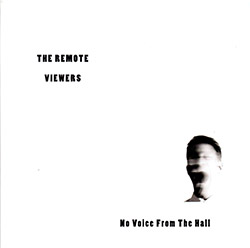
The noise of art? Herewith it's emitted via a cacophony of yowls en masse — and in fits and starts as well — through the less-traveled schema found in the improv playbook courtesy of Brit sax bashers The Remote Viewers. No Voice From the Hall is the fifteenth release from this venerable outfit, and they've aged like cabernet exposed to the sun: pungent, astringent, and acidic, four of the septet issue an utterly vainglorious racket from their fleet of horns, under which drums, bass, and assorted esoteric electronic devices attempt some measure of ballast. It's a rollercoaster of form, chaos barely held in check for the duration, until someone assaults a valve and all hell breaks loose again.
But we digress. The Remote Viewers have a long and storied history across the U.K.'s improv circuit, and the niche they've carved out for themselves is connected to a rich tapestry of post-Coltrane/Ayler free enterprisers severing the jugular of traditionalist 'jazz' norms in search of space. The links are fairly explicit, both physically and tonally. Bassist John Edwards is a genre veteran, as a former member of the infamous B-Shops for the Poor, and there's more than just a hint of the Shopper's clarion calls within the Viewers's remit. Horn players Sue Lynch and Caroline Kraabel open gaping seams in the group's compositions with the same moxie and energetic venom as mainstays Adrian Northover and David Petts. Drummer Mark Sanders squares the circle; amidst the spit and polish, his is a powerful presence kept to the shadows for the most part, lest he become wholly subsumed in the ever-burgeoning maelstrom galvanized by his partners.
The bulk of this gargantuan recording is taken up by the nine-part comprovisation that is the album's title. Alternating bits of call and response with tense-filled moments of probing, searching nuance, the septet leapfrog between 'delicate' poise and abrupt thunder, Sanders and Edwards the phantom navigators who brilliantly fail to regain control of the rocking ship — in this regard, their percussive/pulse attack wants to overwhelm as it seeks to contain. Conversely, the quartet of horns, when reaching extreme levels of Borbetomagus proportions, weave and bob as they come to grips with ever more tumultuous seas of sound. When the recording reaches critical mass, even the final, waning notes feel like supernova explosions left to disperse in the ether. As a welcome breath of air to the sometimes stultifying provenance of lowercase improv, The Remote Viewers provide a much-needed kick in the brass.
Comments and Feedback:
|



